Prof. Andrejs Skaģers: Everybody has always been very supportive – all I had to do was work!
At the Senate meeting on 26 February the honorary title of Professor Emeritus was granted to oral and maxillofacial surgeon Professor Andrejs Skaģers from the Department of Oral and Maxillofacial Surgery of the Faculty of Dentistry of Rīga Stradiņš University (RSU). He received this title for his contribution to the administrative, paedagogical and scientific work of RSU.
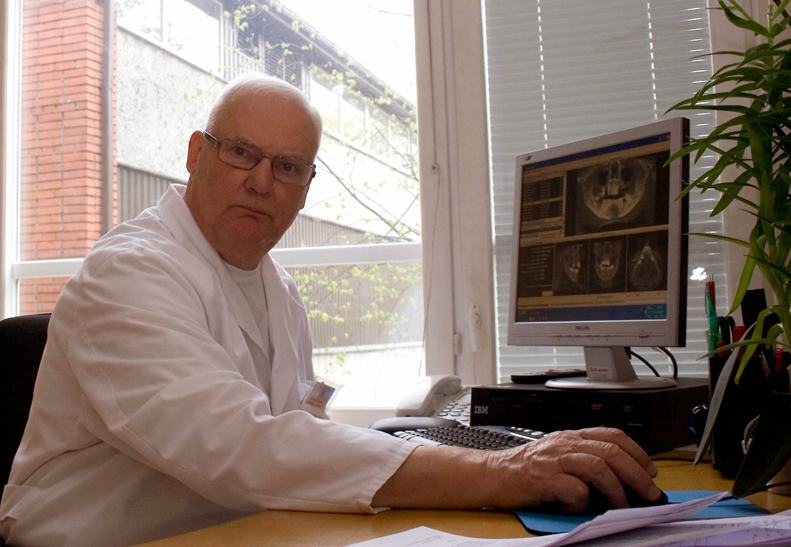
Prof. Andrejs Skaģers at the RSU Institute of Stomatology on 2 May 2011.
He began working at RSU 42 years ago, in 1977, at what was then the Riga Medical Institute (RMI). Andrejs started out as an assistant professor at the Surgical Dentistry Department, which is currently called the Department of Oral and Maxillofacial Surgery, but in 1978 he was promoted to Head of the department. This road has not, however, been easy.
Andrejs Skaģers obtained his physician’s diploma in 1964 and was working at the hospital as a surgeon when Rector Vladislavs Korzāns (Rector of RMI and the Latvian Medical Academy from 1963 to 1992) suggested he change his area of specialisation and start working in dentistry.
‘Initially I objected, because I do not have a dentist’s diploma and furthermore I had not extracted a single tooth. The Rector comforted me saying that my predecessor, Professor I. Bākulis, had also been a surgeon and had not pulled out a single tooth. Besides, he had not been the head of a department, but was the Dean of the Faculty of Dentistry,’ Andrejs Skaģers remembers in the book Professor Vladislavs Korzāns: the Person and the Rector. Andrejs then spoke to his superior at the Riga 2nd Hospital, Prof. Vilis Purmalis, who pointed out that it is not often that such chances arise, and so Andrejs agreed to the Rector’s proposal.
Andrejs studied surgical dentistry autonomously and was initially afraid to extract teeth, and was also afraid of the liability that the position of department manager held. Everything soon sorted itself out, however. He considers Assistant Professor Astra Lināre to have been his main teacher. She was the head of the Department of Surgical Dentistry from 1960 to 1962 and from 1976 to 1978 before the position of Head of Department was entrusted to Andrejs. He is currently writing a book about her.
During these years he taught various courses: among others Diagnosis and Therapy of Surgical Diseases (general, cardiac and thoracic surgery), Oral and Maxillofacial Surgery, Oral and Maxillofacial Surgical Anatomy and Operations. He has been the scientific supervisor of 13 doctoral theses, nine of which have been successfully defended, and four are still in progress.
Andrejs Skaģers headed the Department of Oral and Maxillofacial Surgery until 2014 and he considers this period to be the most successful of his life. He is currently a part-time employee of RSU and conducts maxillofacial surgery classes for students of the Faculty of Medicine. He has, however, decided to end his work at the higher educational establishment within the near future.
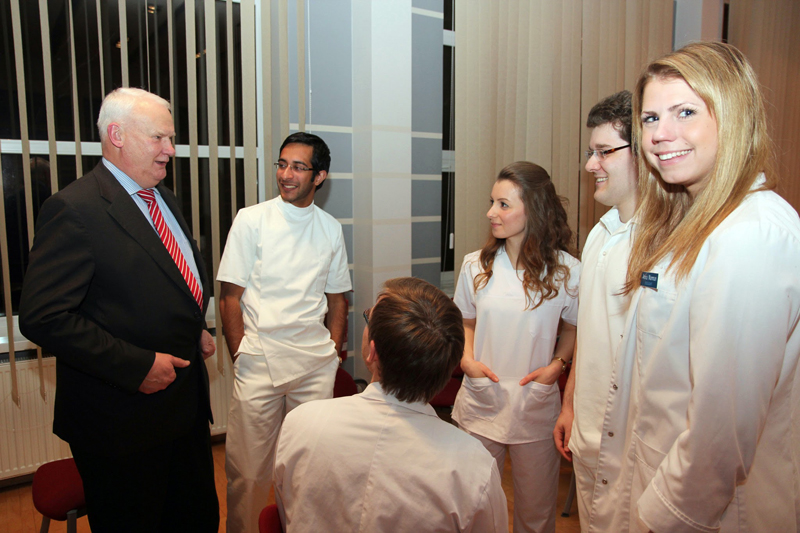
Chairman of the RSU Senate, Prof. Andrejs Skaģers (first from the left), talks to 3rd year students of the Faculty of Stomatology (currently – Dentistry) at the White Lab Coat Celebration at D. Kalvelis Auditorium on 16 January 2012.
Seeing how quickly technologies is developing, and how people are being replaced by robots in the labour market, dentistry nevertheless seems to be one of the areas where it would be impossible to replace humans.
There have been attempts to use robots to place dental fillings. Pēteris Apse, a former professor at RSU and dental prosthetist, once tried that in Toronto, Canada. Theoretically a robot can do it, but patients are living beings who do not always sit as calmly as the robot has been programmed to expect.
Why did you once choose to study medicine?
Mirdza Ardava, my natural sciences teacher at Dzelzava Primary School, encouraged me to study medicine. I later learned that she went on to study medicine too and became a general practitioner. I have to add that there was another teacher who urged me to become an actor since I acted a lot while at primary school. I was good at it. At the primary school graduation she even presented me with a book by famous Russian director Konstantin Stanislavsky, who was the founder of the art of psychological acting. I acted less and less during secondary school, and then I had the option of going into forestry, because my father was a forester... My mother was very ill, however, so, I finally chose medicine. The competition over one study place was high in 1958 when I applied to the Faculty of Medicine – six applicants per one study place.
Why did you choose surgery?
Initially, I wanted to be a therapist – it was considered to be more refined – but during my 4th year I fell in love with surgery. My first teacher was oncologist Professor Veronika Rozenbaha, a student of Pauls Stradiņš. Together with her we operated on breast cancer, and I wrote my first research paper under her supervision. She was a very calm supervisor. During my 5th year we were transferred to Riga 1st Hospital, and I continued to work as a hospital surgeon there. Neurosurgeon Professor Aleksandrs Liepukalns was working there at the time. I wrote a scientific paper under his supervision as well. He would just have turned 120 years – I always leave a candle for him at the Rīgas Meža Kapi cemetery. He did not have children. He supported student interest groups and came and listened at our sessions. He sometimes asked his wife to make tea for us. They both lived on the second floor of Riga 1st Hospital.
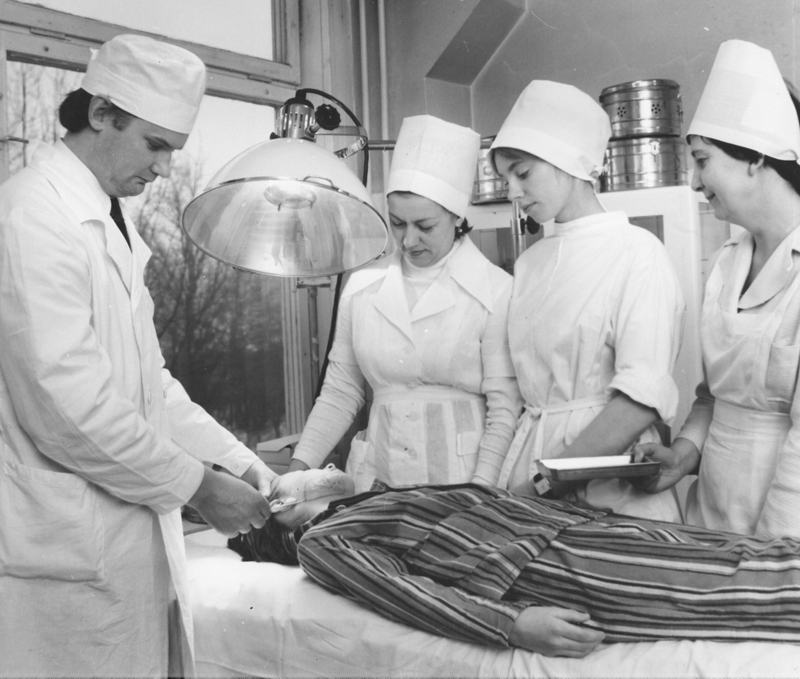
Late 1970s. At the United Polyclinic of Dentistry at Dzirciema iela 20 (currently the RSU Institute of Stomatology is located at this address). From the left: Andrejs Skaģers, Head of Department Valentīna Kandaūrova, clinical intern Rasma Ondzele and department nurse (name and surname unknown). From the RSU Museum archives.
Jella Upmane, Assistant Professor at the Department of Hospital Surgery, was one of my teachers. The system then was very good: there was general, faculty and hospital surgery. Principles were taught within the general surgery programme, diseases within the faculty programme, while work with patients was covered by hospital surgery. Thus, every student went through these three logical levels. Nowadays everything is joined in one department and nothing is separated which I don’t think is the best system.
I worked a lot at Riga 1st Hospital where I performed some 25 appendectomies. Asst. Prof. Upmane trained me well and gave me the opportunity to work.
After being there I worked as a surgeon in Kazakhstan at the Hospital of the Kimpersai Mines which is in the Aktyubinsk region. During the Soviet era the so called all-union physician distribution system was in force. In accordance with this system physicians were sent where they were most needed. My principal motivation of going there was to avoid being enlisted in the army for 25 years. The Hospital of the Kimpersai Mines was my first workplace and I worked there for three years.
Will you attend the RSU Research Conference in April, which will be held on international level for the first time?
I will give a report on bio-material research at the Institute of Stomatology. The report is about an artificial material that is grown in laboratories and then used to treat patients, for instance to replace a damaged jaw. Research on this has been conducted at the Institute of Stomatology for over 20 years, and about 20 dissertations have been written on this topic.
In your opinion, what should be changed or improved in the study processes at RSU?
I believe that the way that lectures nowadays are structured by making attendance voluntary is wrong. Perhaps they could be called seminars, rather than lectures, to ensure that students attend them. Sometimes almost all students arrive for a lecture, but at another time there are only two or three. New ways must be sought to make them interested in coming and getting an in-depth and comprehensive knowledge on a particular topic. It is my job to conduct classes, which I am doing, whereas it is the students’ job to study. I do not understand how they can afford not to come to work.
Sometimes I ask my students to read up on a particular topic on the e-studies platform before they come to my class, because then, when we meet in person, they can ask questions and we can organise a discussion. I have observed that they learn theoretical material in a short amount of time, but they lack the knowledge of how to use this theory in practice. If, during an exam, I ask about something which is beyond the scope of the information on the e-studies platform students who have not attended the classes do not know the answer. It’s a shame!
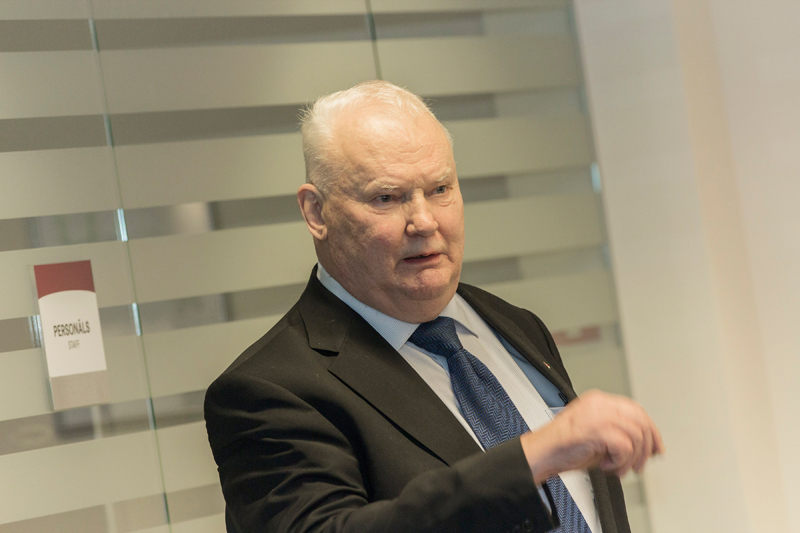
The opening of Professor Žeidurs’ centenary book at the RSU library on 25 January 2018.
What will you do when you won’t have to come to the university anymore?
There’s a lot of work left! For example, I am still overseeing four dissertations, and I am writing a book on the Professors Astra and Jevgēnijs Linārs.
My family has a house by Usma Lake. There is a forest nearby. I like to pick mushrooms and work in the garden – planting, caring for my orchard. I have been living there each summer for 40 years already.
Looking back at what you have achieved, what are you most gratified about?
My family has been most important, that my children have received good educations, and that my grandchildren are studying already. At work everything has gone well. I have had a good relationship with all Rectors. Everyone has always been supportive, so all that was left for me to do was work.
Facts about Prof. Andrejs Skaģers
- 1964 – Received his medical diploma at Riga Medical Institute
- 1986 – Defended his dissertation
- Since 1986 – RSU Professor
- Since 2009 – Member of the RSU Professors’ Council
- Since 1998 – Member of the European Association for Cranio Maxillo Facial Surgery
- 2008 – 2014 – Chairman of the RSU Senate
- Received several awards: Order of the Three Stars (2008), Pauls Stradiņš Award (2006), and others.
- Author and co-author of 260 publications.
- Co-author of several books and patents.
- His professional priorities are dental implantology and the use of biomaterials, plastic surgery, and the surgical treatment of snoring and obstructive sleep apnoea.
- The foundation of his research is the integration of biomaterials replacing bone tissue, blood circulation and regenerative problems, and obstructive sleep apnoea.
Related news
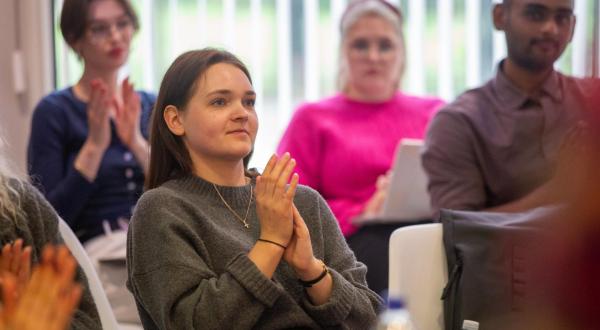 18 Student teams to start developing their ideas in B-Space incubation programmeFor RSU Employees, For Students, Innovation, B-Space
18 Student teams to start developing their ideas in B-Space incubation programmeFor RSU Employees, For Students, Innovation, B-Space


